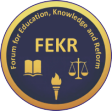Women’s Informal Political Agency in Conservative Societies: Voice Without Power?
Abstract
This paper explores the concept of women’s informal political agency in conservative societies, with a particular focus on Pakistan’s Khyber Pakhtunkhwa and Balochistan provinces. While formal political spaces often exclude women due to entrenched patriarchal norms and structural barriers, many continue to exert significant influence through informal and culturally sanctioned modes of participation. Drawing on feminist theoretical frameworks—including Kabeer’s (1999) model of empowerment, Mahmood’s (2005) notion of embodied agency, and Crenshaw’s (1989) intersectionality—the study investigates how women navigate political landscapes through kinship, religious authority, and moral legitimacy. Using qualitative methods, including in-depth interviews and focus groups, the study reveals that women exercise considerable voice, yet often lack institutional power—a condition termed "voice without power." Findings show that women influence community decision-making and dispute resolution but face structural limitations in formal politics. The paper concludes that informal agency, while vital, remains fragile unless integrated into broader governance frameworks. Policy recommendations include institutional recognition of informal leadership, context-sensitive empowerment programs, and intersectional policy audits. The study contributes to feminist political theory by highlighting culturally embedded forms of agency and proposing new strategies for inclusive governance.



